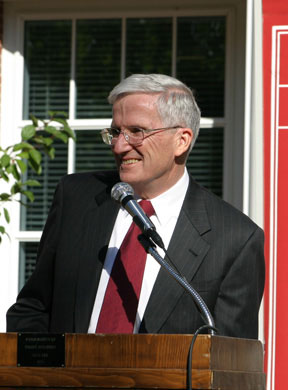"We cannot leave to chance the transmission of the culture from one generation to the next, but must work consciously to sustain the values and characteristics that we value so highly."
 With the successful conclusion of the Campaign for Leadership, the naming of our new biology and chemistry facility in honor of Tom Hays ’55, and the renovation of Goodrich Hall for physics and mathematics, we had a great deal to celebrate this fall, and extraordinary weather in which to do so. In the midst of all these festivities, we continued working toward a new iteration of the College’s Strategic Plan.
With the successful conclusion of the Campaign for Leadership, the naming of our new biology and chemistry facility in honor of Tom Hays ’55, and the renovation of Goodrich Hall for physics and mathematics, we had a great deal to celebrate this fall, and extraordinary weather in which to do so. In the midst of all these festivities, we continued working toward a new iteration of the College’s Strategic Plan.
We consulted alumni groups in Chicago, Indianapolis, New York City, St. Louis, South Bend, and Washington, D.C., reporting our progress on the current plan and asking what they thought the College should concentrate on in the next few years. By the time you receive this issue of the magazine, we will have conducted additional sessions in other places. On the campus and off, we have found significant enthusiasm for our Statement of Mission, Core Values, Vision, and Strategies. Alumni five months out to those 50 years out urged us to make sure that we maintain that special relationship that exists at Wabash among students and between students and faculty.
In October, the Board of Trustees reaffirmed these findings. Meeting for an extra day on campus (as it will again in January) to consider strategic planning under the leadership of John Fox ’64 and David Shane ’70, the Board determined that none of the current Initiatives should be abandoned. My staff and I are still sifting through the results of the Board’s deliberations and our meetings with alumni, but two themes have emerged with special force and clarity.
We’ve discovered an abiding interest in, and concern for, ensuring that the values and qualities that have characterized Wabash men over the last 50 or so years continue for another 50. This theme usually begins with a discussion of living facilities (and how we need to finish the Fraternity Partnerships as quickly as possible), but talk soon turns to the way students live in fraternities, as well as in residence halls. Participants recognize that both circumstances and students change. The cumulative effect of these changes requires the College to be more deliberative and conscious of the impact it intends to have on students. We cannot leave to chance the transmission of the culture from one generation to the next, but must work consciously to sustain the values and characteristics that we value so highly. No one has come up with a quick or easy way to preserve the culture, yet everybody wants it to be done.
We also discovered a near universal concern that our students be better positioned to get their first job when they graduate from the College. There seems little concern about how our graduates fare in the long term, but there is significant concern for the short term, for that first job. Some of this concern undoubtedly stems from having so many alumni who recruit students to the College and then see them disappointed in their first job offer or having to work harder than they had imagined to get one. We marvel at the concerns of such committed alumni, and we intend to respond to them as positively and as fully as we possibly can.
Strategic planning conversations continued with faculty, students, and staff this fall. The Board will meet again in January 2005, hoping to complete the extension of the current plan at its May meetings. There is still plenty of time for you to let us know what you think the College should be especially concerned about accomplishing in the next five years or so.
Please send me a note or an e-mail. I look forward to hearing from you.
Andrew T. Ford H’03
President
forda@wabash.edu